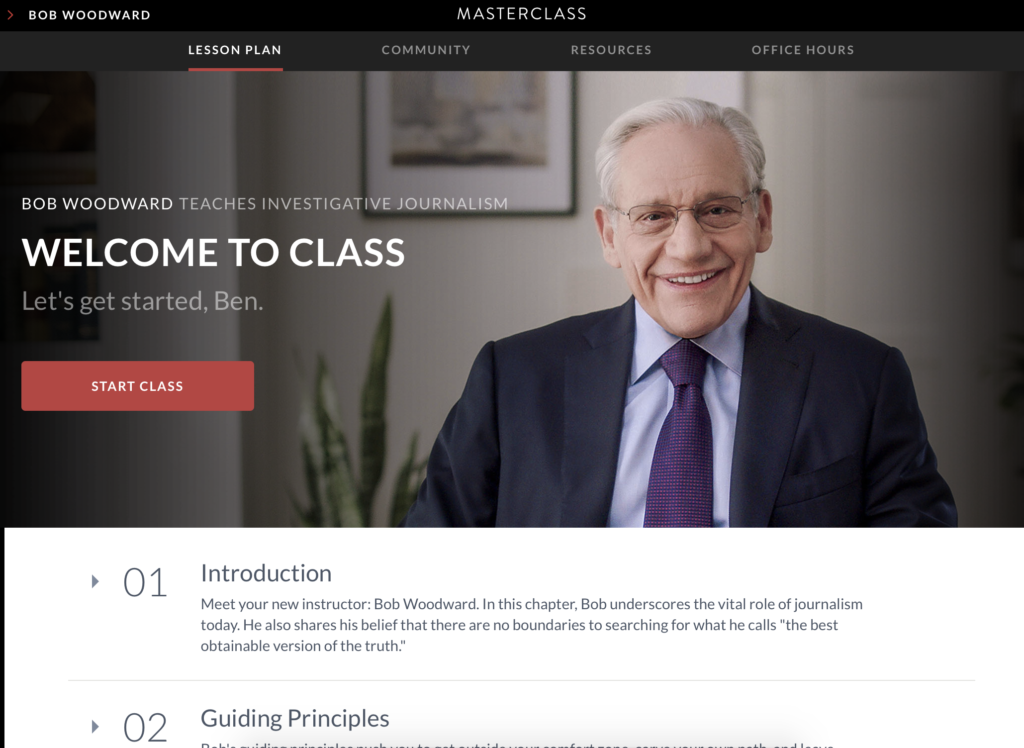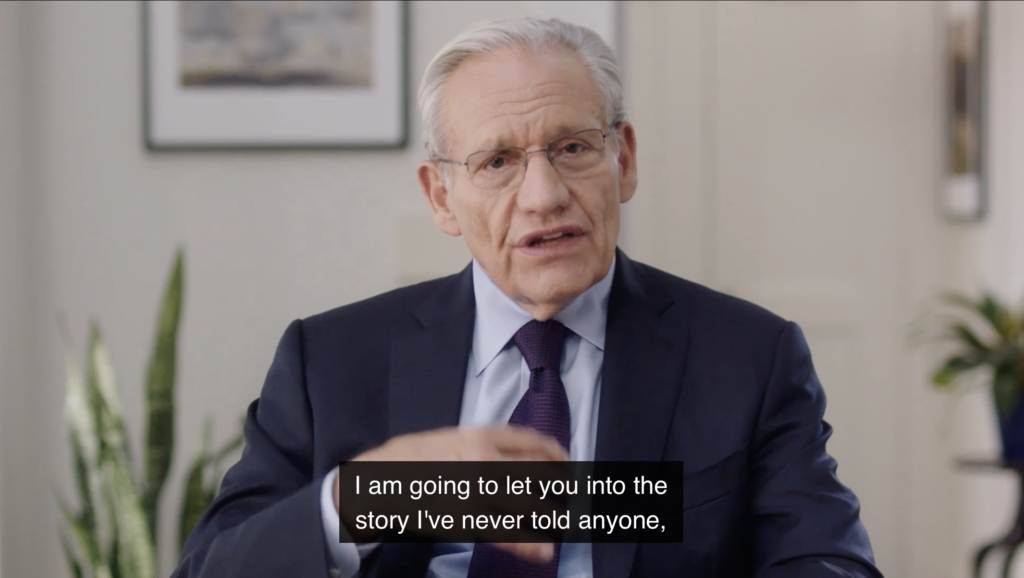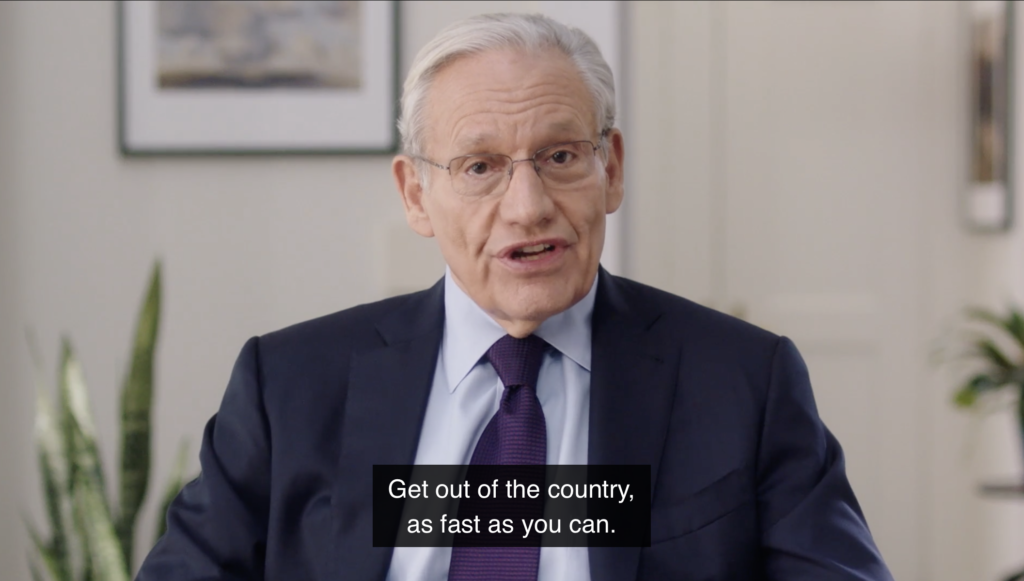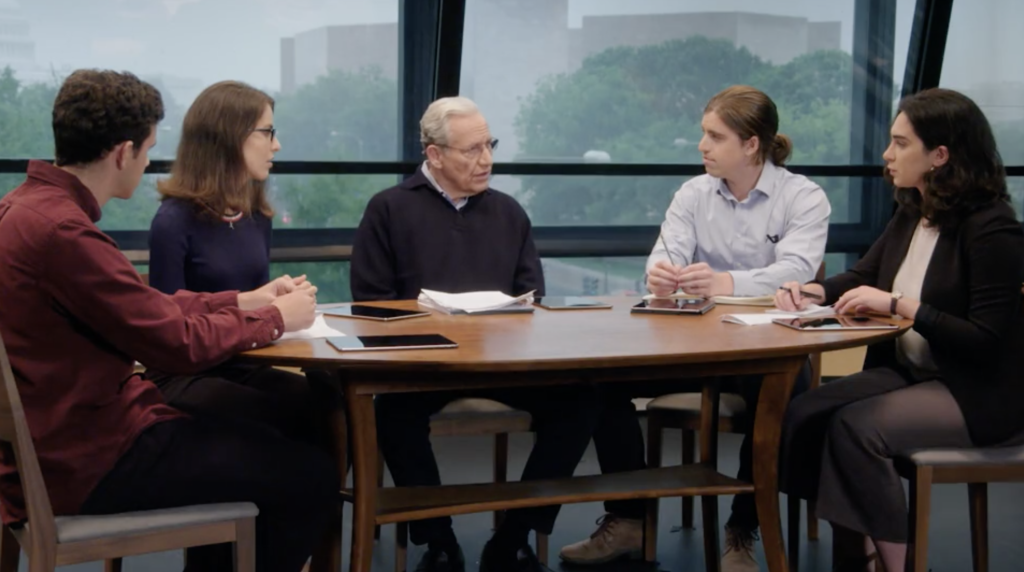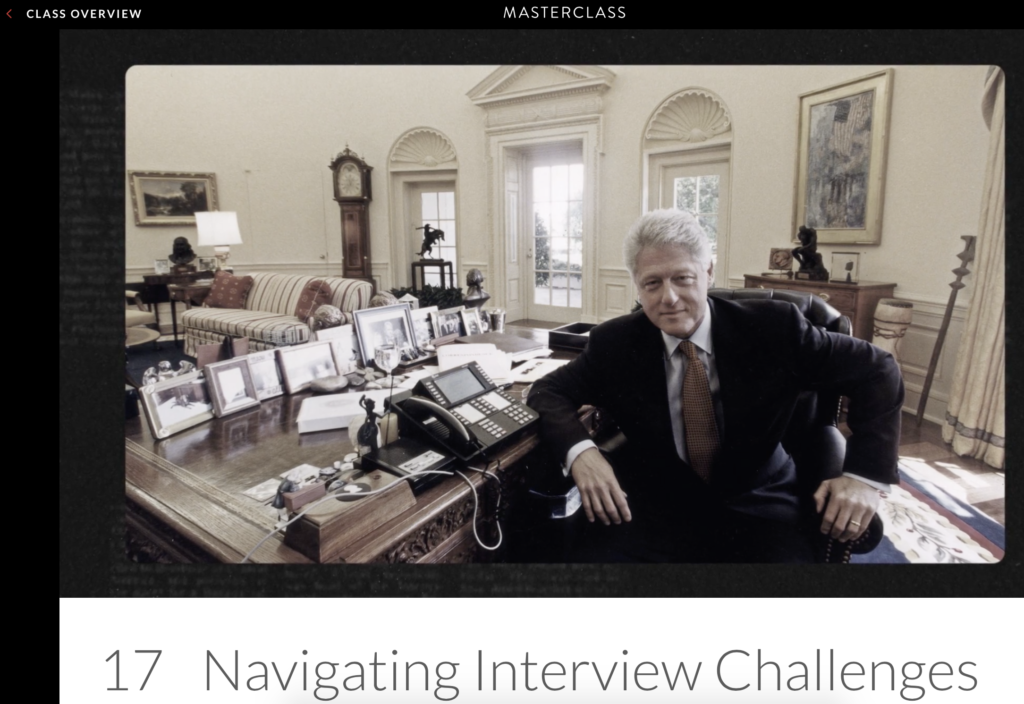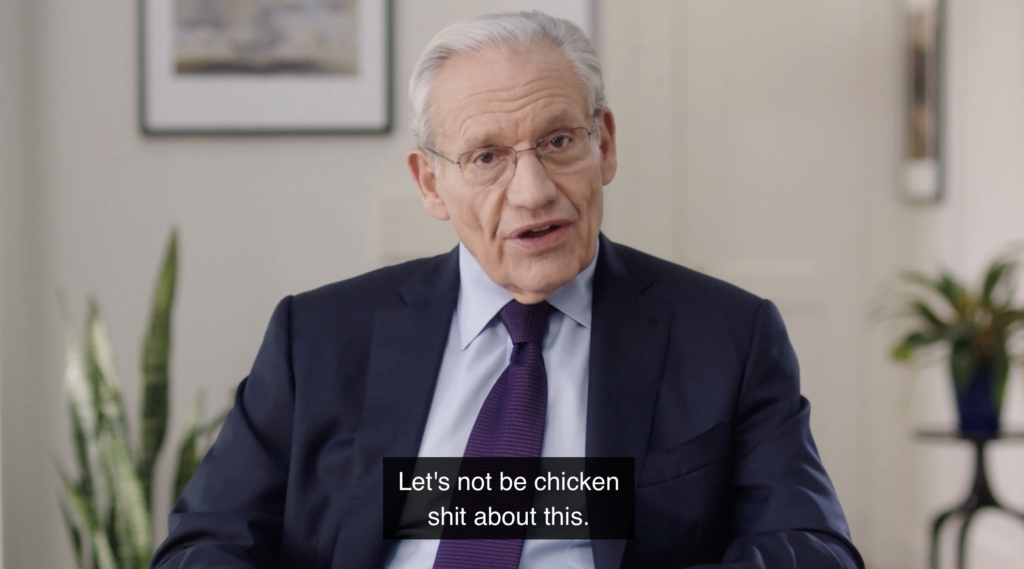I’ve held immense respect for Bob Woodward’s investigative journalism ever since I saw All the President’s Men in my teenage years. I went on to devour his Pulitzer Prize winning work and many of his fascinating non-fiction books. For years, I had dreams of becoming an investigative journalism myself (primarily interested in war-torn regions and government corruption). So when I logged into my MasterClass All Access Pass area and saw the latest addition to their robust catalogue was the Bob Woodward Teaches Investigative Journalism MasterClass, I wasted no time getting stuck in.
I honestly don’t know how MasterClass continue to get all of my heroes in one place. It’s incredibly impressive. If you’re thinking about getting into investigative journalism yourself and you’re keen to learn from one of the greats, I hope my review of the Bob Woodward MasterClass will give you a good idea of what to expect.
Now let’s get into the Bob Woodward Teaches Investigative Journalism MasterClass review.
Here’s my Bob Woodward Teaches Investigative Journalism MasterClass review
Most people who are well-read and stay abreast of current affairs know who Bob Woodward is. He’s most famous for his Pulitzer Prize winning reporting on the Watergate scandal and the 9/11 attacks. If you read The Washington Post, you’ve definitely come into contact with Woodward’s work.
Those who are on the path to becoming investigative journalists have most likely dug much deeper, keen to learn the tricks of Woodward’s world-class reporting.
Bob Woodward has authored and co-authored bestsellers such as:
- Bush at War
- The Final Days
- Obama’s Wars
- The Commanders
- All the President’s Men
- Veil: The Secret Wars of the CIA
- The Brethren: Inside the Supreme Court
- The Agenda: Inside the Clinton Whitehouse
All the President’s Men made it into TIME Magazine’s Top 100 Nonfiction Books of All-TIME, calling it ‘perhaps the most influential piece of journalism in history’.
Anyone who wants to become an investigative reporter, regardless of their political standpoint, will be interested in learning from Bob Woodward.
The question is…
Is the Bob Woodward Teaches Investigative Journalism MasterClass as good as you’d expect it to be?
The Bob Woodward MasterClass begins with an assignment.
Your class project is a 3,500–4,500 word investigative reporting project aimed at examining a government program, school, local event or business.
The idea is that you use the advice in Bob’s MasterClass as you go through different stages in planning for and writing your investigative piece.
The course materials – both Bob’s video classes and the course workbook – are set out logically to aid you as you put together your piece.
There are 24 gorgeously produced video lessons in the Bob Woodward MasterClass with each video module having an average length of 10-20 minutes and a total runtime of 4+ hours.
With the extra exercises, resources, reading lists, and tips in the workbook, along with the fact that you are going to be researching and writing up your own investigative piece, you’re easily looking at several weeks or months (depending on your schedule) of work and education.
The video modules are sequenced logically in order to help you whilst writing your investigative reporting assignment. But each one works incredibly well as a stand-alone writing class too and they have immense replay value.
I won’t list all of the video modules here (check them out yourself) but I will say some of my favourites were:
- Student’s Dig into Woodward’s Interview with Trump
- The Reporting Challenges of Watergate
- Developing the Theory of the Case
- Navigating Interview Challenges
- Growing Your Roster of Sources
It’s difficult to narrow down just a few favourite lessons because the entire MasterClass is a treat and Woodward’s advice in every area – from finding the story and hunting down documents to preparing and conducting interviews – is fantastic.
What I really loved about Bob Woodward’s approach to teaching journalism is that he gives out these timeless wise principles of writing and investigating and sits them side-by-side with real life stories from the trenches that gets your heart pounding.
Bob Woodward’s MasterClass is half writing class, half adrenaline-pumping political thriller.
It’s hard not to want to get out there and start breaking stories when Bob tells us tales of going tête-à-tête with Bush, Obama, Clinton, and Trump or having to flee from Tripoli ASAP after pissing off Gaddafi.
Everything in Bob’s approach to journalism – from interview to finding sources – comes back to uncovering the best stories.
This MasterClass does a great job of giving you the tools and showing you what it takes to find what Bob calls “bacon cooler stories”.
Bacon cooler stories are those stories that are so good, so shocking, so compelling, that when you read them in the morning newspaper as you eat your breakfast, you pause in bringing the forkful of bacon to your mouth. And the bacon cools while you devour the whole story.
The business of journalism is to cross lines – Bob Woodward
The majority of the video modules in the Bob Woodward MasterClass are of Bob talking directly to us and dropping wisdom every single second.
A smaller slice of the course was devoted to Bob sitting with a group of up-and-coming investigative journalists and analysing interview tapes together.
I would have loved a lot more of this content because it was absolute GOLD and totally worth the price of admission alone.
When we analysed the Trump tapes (recorded in 2016 when he was on the edge of becoming the Republican nominee) we learnt so much about the decisions that go into effectively interviewing someone.
We learn about how and when to interrupt during an interview, how to set terms of engagement, how to move on from a question, how to pick a lede to a story, the purpose of an interview, dealing with inaccuracies, perspective bubbles (law background etc.), how to find out the interviewee’s driver, and so much more.
Great stories have to do with power—how people [are] using power, abusing power – Bob Woodward
Listening to Woodward talk about Trump was also a nice and rare display of impartial journalism. I feel like the journalists sitting around Bob in this segment were obviously anti-Trump. And that’s fine. But it was very nice to see that whilst some of them had emotional responses to Trump, Bob’s response was way more neutral.
Bob talks about why he didn’t correct Trump’s inaccuracies and how the nature of an interview isn’t a “gotcha” and it’s not important to waste time on things you or the other person actually know little about.
Bob’s entire attitude is incredibly refreshing and I hope we can someday return to an impartial style of journalism.
Listening to and analysing Bob’s interview tapes with Obama was also wonderfully illuminating.
My presumption is that they’re going to talk about everything, even maybe things they don’t want to talk about. Maybe things that are classified – Bob Woodward
We learn how to deal with awkwardness in interviews, the long pause technique, how to choose a line of questioning, about rapport, pushing too hard or not hard enough, how to choose your words when dealing with emotional subjects and the interviewee.
You also learn that reporters like Bob Woodward reached their position by putting in a staggering amount of work. The level of preparation is awe-inspiring and humbling.
The Bob Woodward MasterClass is perfect viewing before an interview.
If you have an interview or several interviews coming up, I highly recommend enrolling in the MasterClass and paying extra careful attention to Bob’s interview advice.
Bob goes deep into everything from getting into classified information to body language dos and don’ts, the dangers of nodding, how to sequence questioning, making emotional questions part of the story, utilising silence, how to use follow up questions.
I loved hearing about Bob’s techniques for navigating interview challenges. He uses his interviews with George Bush as a case study and details, after he wrote that the President was in a state of denial over the Iraq war, how he handled going into thorny territory.
It’s important to let the silence suck out the truth – Bob Woodward
I also loved Bob’s case study on his interview with Bill Clinton and his warnings to beware of charm and how Clinton’s eye contact, which was almost a gravitational force, basically threw him off his game.
Another part of the course that was worth the price of admission alone was Bob’s advice on writing and developing the case.
There’s some really fantastic stuff and I wish I’d had this advice back in my university days when I was putting together my dissertations. Bob’s advice here is great for tons of different types of non-fiction writing from journalism to law arguments to academic writing and scientific research. And, as usual, he makes all of his technical principles more exciting by showing them alongside personal anecdotes of trouble and strife with presidents like Ford and Nixon.
When it came to learning about Bob’s writing routine, I thought I wouldn’t learn anything new because I’ve heard a lot of writing advice in my time but I actually learned some exciting news rules that I immediately put to go use. All of his advice on polishing the story, adding credibility, and utilising details along with different grammar rules was fascinating too.
Is the Bob Woodward Teaches Investigative Journalism MasterClass worth it?
These days you don’t need to go to university to become an investigative journalist and break stories.
But you still need an education.
We live in an extraordinary time. Instead of having to go into severe debt to get a university education, we can learn from heroes and mentors at the top of their fields right from the comfort of our own homes on our own schedules for a tiny price.
Of course, if you’re already university-educated, still in the middle of your studies, or working your way up the totem poll, consider this course excellent supplementary material to help you improve your craft.
The Bob Woodward Teaches Investigative Journalism MasterClass was easily worth every penny and more if you’re interested in becoming a journalist.
The MasterClass is also easily worth the price of enrolment if you have interest in writing of any kind or wish to go into media or politics or are just fascinated with the current and recent years’ climate of reporting.
If you go for the All Access Pass, the deal is even sweeter and, in addition to having Bob Woodward as your teacher, you can also learn writing from David Mamet, Aaron Sorkin, Malcolm Gladwell, and many more.
